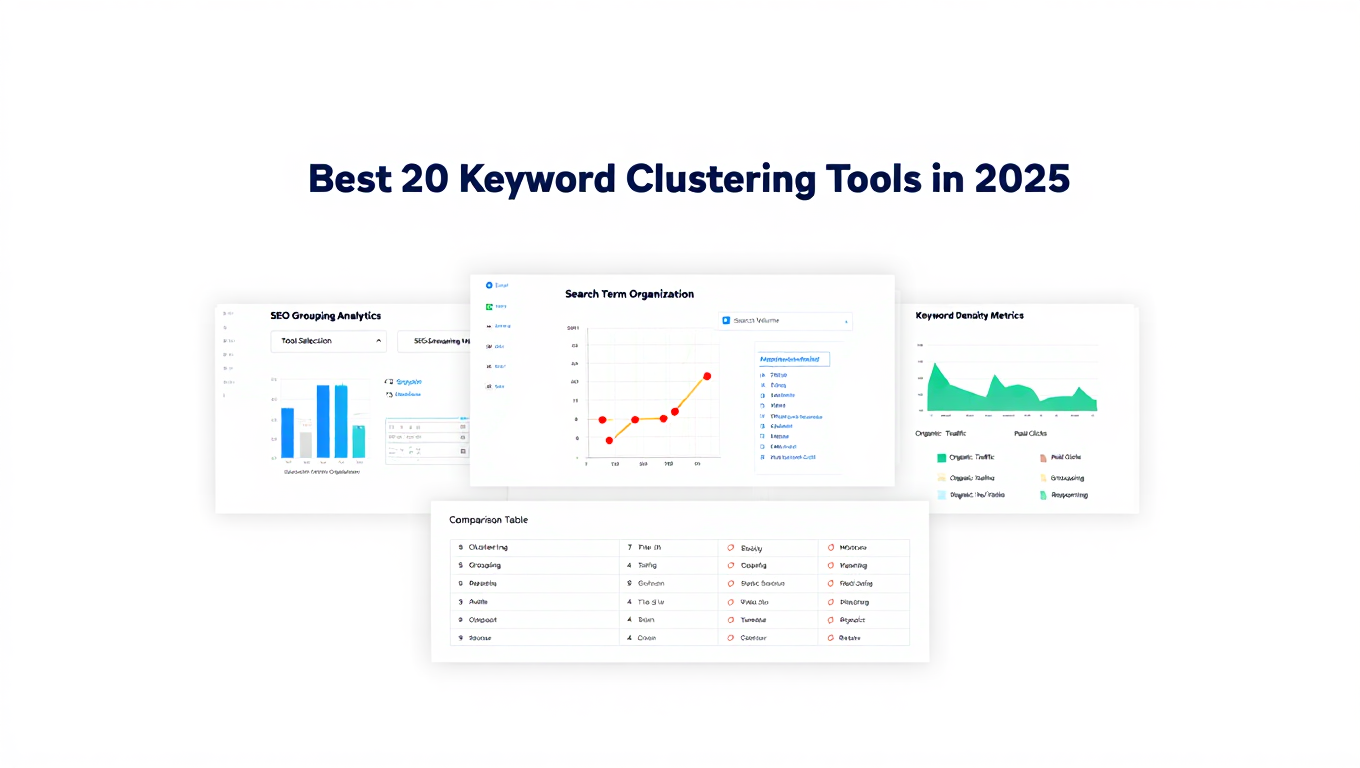According to Backlinko, content organized into topic clusters generates 97% more inbound links than unstructured posts. Websites that use keyword clustering in their SEO strategy see up to 45% higher organic traffic growth (Ahrefs, 2024).
But if your keyword research still ends with a massive spreadsheet, you’re losing efficiency. Keyword clustering tools take that chaos and group your search terms into powerful topic clusters, making it easier to build content that ranks.
At Pearl Lemon, we’ve analyzed and tested over 40 keyword clustering tools across multiple SEO campaigns for clients in eCommerce, SaaS, and lead generation. After all that testing, we’ve narrowed it down to the top 20 best keyword clustering tools that deliver real results in 2025.
Whether you’re an SEO strategist, freelance content marketer, or agency owner, this list is built to help you save time, plan smarter, and create better content structures that actually convert.
What Is Keyword Clustering and Why It Matters
Keyword clustering is the process of grouping similar or semantically related keywords together so you can target them in a single piece of content. Instead of creating 10 separate posts for similar search terms, you strategically combine them to create one authoritative piece.
This approach:
- Improves topical authority
- Reduces keyword cannibalization
- Strengthens internal linking structures
- Makes content planning faster and more data-backed
In short, keyword clustering helps your site speak the language of search engines.
Quick Comparison of the Top 20 Keyword Clustering Tools
These metrics were chosen because they matter most to SEO professionals: pricing, use case, accuracy of clustering, AI capabilities, and platform availability.
| Tool Name | Best For | Starting Price | Free Trial? | Key Feature | AI Support | Platform |
| Keyword Insights | Topic Research & Clustering | $49/mo | Yes | SERP-based Clustering | Yes | Web |
| ClusterAi | Fast Bulk Clustering | $39/mo | Yes | Google SERP Mapping | Yes | Web |
| WriterZen | Keyword Research & Planning | $23/mo | Yes | Golden Filter | Yes | Web |
| SE Ranking | All-in-one SEO Platform | $55/mo | Yes | Keyword Grouping | Partial | Web |
| KeyClusters | SERP-driven Keyword Grouping | $12/mo | No | Bulk SERP API | Yes | Web |
| Surfer SEO | Content Optimization | $89/mo | Yes | NLP Keyword Clusters | Yes | Web |
| Topic Mojo | Question-based Keyword Clusters | $49/mo | Yes | Topic Discovery | Yes | Web |
| KeyWI | AI-Powered Keyword Grouping | $50/mo | Yes | Smart Cluster Logic | Yes | Web |
| Clusteric | Technical SEO & Clustering | $59/mo | Yes | Rank Tracking + Clustering | Yes | Web |
| Ahrefs | Keyword Data & Analysis | $99/mo | No | Keyword Explorer | Partial | Web |
| SEMrush | Advanced Keyword Planning | $129/mo | Yes | Keyword Magic Tool | Partial | Web |
| SERanking | SMB SEO Teams | $55/mo | Yes | Keyword Grouping Tool | Yes | Web |
| SE Ranking | Agency Keyword Research | $55/mo | Yes | SERP Comparator | Yes | Web |
| NeuralText | Keyword Strategy + AI Writing | $49/mo | Yes | Keyword Clustering + AI | Yes | Web |
| Keyword Cupid | Automated Clustering | $9.99/mo | No | Mindmap Output | Yes | Web |
| Cluster AI by Content Distribution | Bulk Keyword Organization | $39/mo | Yes | SERP Intent Matching | Yes | Web |
| KeyClusters.io | Large Data Sets | $14/mo | Yes | SERP Intent-based Groups | Yes | Web |
| TopicRanker | Niche Keyword Ideas | $59/mo | Yes | Content Gaps & Clusters | Yes | Web |
| SEOScout | Content Optimization | $49/mo | Yes | Keyword Grouping + Auditing | Yes | Web |
| Frase | AI Content + Clustering | $14.99/mo | Yes | Topic Model Generation | Yes | Web |
Top 20 Keyword Clustering Tools
1. Keyword Insights – Smarter Keyword Clustering with SERP Precision
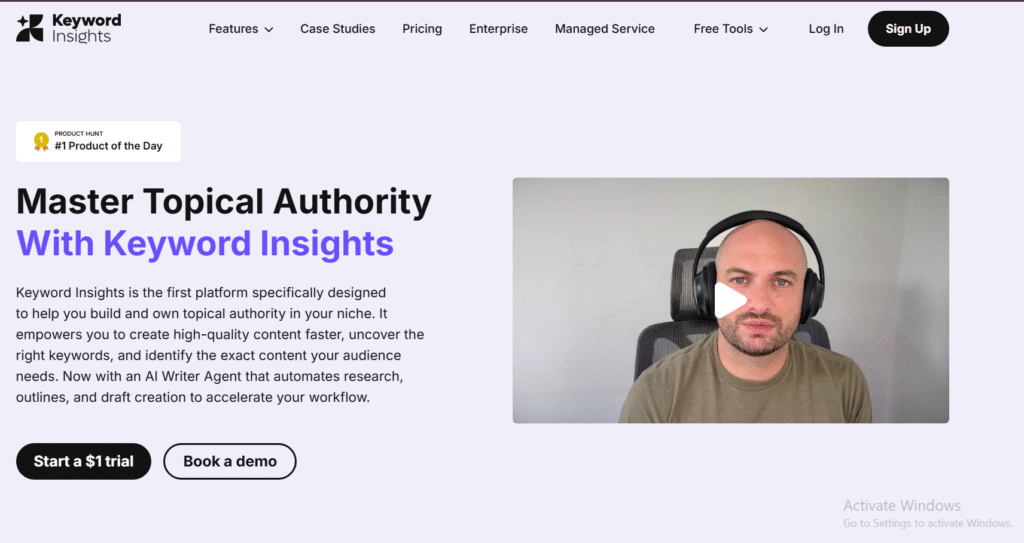
Keyword Insights is one of the most advanced keyword clustering tools for SEO specialists who want accurate, SERP-driven clusters. It analyses live Google results to identify intent overlaps, letting you group hundreds or thousands of keywords without relying on guesswork. Agencies and content teams use it to streamline keyword research, plan topical maps, and organise large-scale SEO campaigns efficiently.
Key Features
1. SERP-Based Keyword Clustering
Keyword Insights groups terms based on shared URLs in Google’s top results. This ensures that each cluster reflects real search intent rather than random text similarity. It’s particularly valuable for planning pillar pages and supporting articles that build topical authority.
2. Intent Detection
Every keyword is automatically tagged with its intent—informational, transactional, navigational, or commercial. This helps content strategists understand the searcher’s mindset before writing, reducing wasted content production time.
3. Bulk Upload Capability
You can upload large keyword lists (up to 10,000) directly into the platform. The system processes and clusters them within minutes, making it ideal for agencies managing multi-client accounts.
4. Keyword Context Explorer
This feature provides related queries and context keywords for each cluster, helping writers understand the topic better and write more comprehensive content.
5. Geo-Targeting Options
Keyword Insights allows country and language-specific clustering, ensuring that your SEO strategy matches the right audience and search landscape.
Pros and Cons
| Pros | Cons |
| Accurate, SERP-driven clustering | Slightly higher pricing for small teams |
| Fast processing time for large datasets | Interface can feel technical for beginners |
| Built-in intent labelling | Limited integration with other SEO tools |
| Intuitive reporting dashboard | No mobile app support |
| Excellent for topic mapping | Occasional lag with very large imports |
Pricing
Keyword Insights offers flexible pricing depending on usage. The starter plan begins at $49 per month, with higher tiers available for agencies and enterprise teams. Each plan includes a set number of keyword credits, with pay-as-you-go options for additional volume.
Best For Agencies and Content Teams Managing Complex Campaigns
Keyword Insights is built for SEO agencies and content strategists who handle large keyword sets and need clean, actionable data for planning.
- SEO consultants — streamline keyword clustering for client projects
- Content managers — create precise content maps for internal teams
- Agencies — handle multi-site keyword research efficiently
- Copywriters — understand searcher intent before content creation
- Freelancers — manage affordable one-off clustering tasks
Verdict:
Keyword Insights delivers highly accurate clusters based on real SERP data, giving teams clarity and saving hours of manual sorting. A practical tip: use the intent filter before exporting clusters to build your editorial calendar around search demand, not assumptions.
How to Use Keyword Insights for SEO Strategy Planning
Start by uploading your raw keyword export from Ahrefs or Google Keyword Planner. Let the system cluster and label intents automatically, then export the results to Google Sheets. This simple workflow can cut keyword research time by 80% and eliminate overlapping content topics.
Best Alternate Tool
If you’re seeking a simpler interface with similar SERP-based logic, try ClusterAi. It’s more lightweight, though it lacks the intent tagging feature of Keyword Insights.
2. ClusterAi – Fast, SERP-Driven Keyword Clustering for Busy Marketers
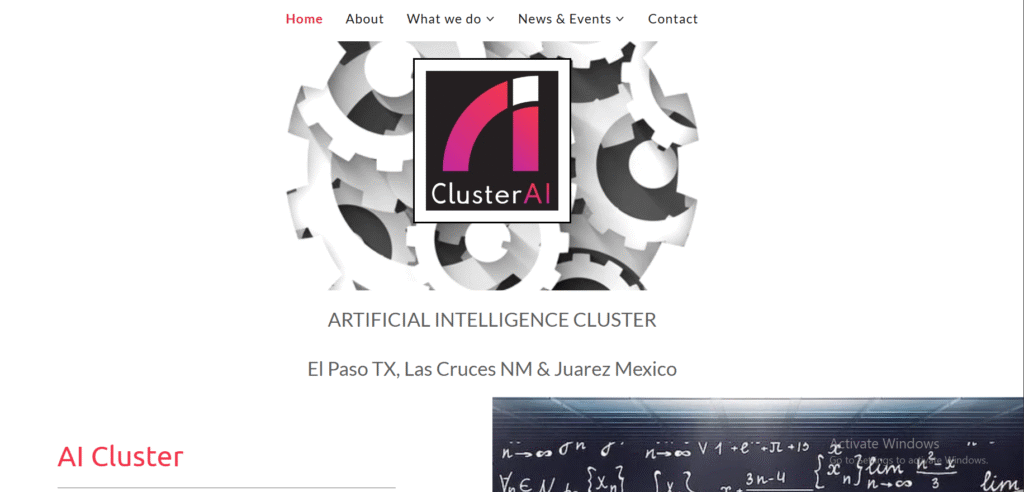
ClusterAi is a keyword clustering tool built for speed and simplicity. It’s ideal for marketers who want quick, accurate groupings without the need for deep setup or complex configuration. ClusterAi connects directly to Google SERPs, grouping keywords by shared top-ranking pages, ensuring reliable and intent-based clusters.
Key Features
1. One-Click Keyword Upload
ClusterAi allows instant uploads of thousands of keywords via CSV, streamlining bulk clustering without any technical steps.
2. SERP Overlap Algorithm
It analyses the top 10 Google results for every keyword and groups them based on shared URLs, creating precise clusters that reflect how search engines see topical relevance.
3. Simple Export Functionality
Once clustered, you can export your results as a clean spreadsheet, ready for use in content planning or keyword mapping tools.
4. No Setup Required
Unlike more complex platforms, ClusterAi works entirely from your browser with no need to integrate external APIs or connect keyword databases.
5. Intent Mapping Simplified
While it doesn’t label intent automatically, the SERP-based clusters naturally reflect user intent, making manual tagging straightforward.
Pros and Cons
| Pros | Cons |
| Fast and accurate SERP clustering | No built-in keyword research feature |
| Easy to use for beginners | Limited to English-language clustering |
| Affordable for freelancers and small teams | No automatic intent tagging |
| Excellent for quick data processing | Doesn’t offer deep analytics |
Pricing
ClusterAi starts at $39 per month with a generous keyword limit. Annual plans offer discounts, and a free trial is available for smaller keyword lists.
Best For Small Agencies and SEO Freelancers
- Freelancers — manage keyword research quickly without complex dashboards
- SEO consultants — use as part of broader keyword analysis workflow
- Content teams — identify pillar content opportunities fast
- Start-ups — save budget while scaling content
Verdict:
ClusterAi is perfect for anyone needing speed and simplicity without compromising accuracy. To make the most of it, combine ClusterAi with a keyword research tool like Ahrefs or SEMrush to identify opportunities before clustering.
How to Use ClusterAi for Campaign Structuring
Use ClusterAi after your keyword discovery phase. Export your clusters into Google Sheets and map them to existing or upcoming content pieces. This approach helps you identify cannibalisation issues early.
Best Alternate Tool
Try KeyClusters for similar SERP-based clustering with added bulk import features at a lower price point.
3. WriterZen – Keyword Research and Clustering for Content Teams
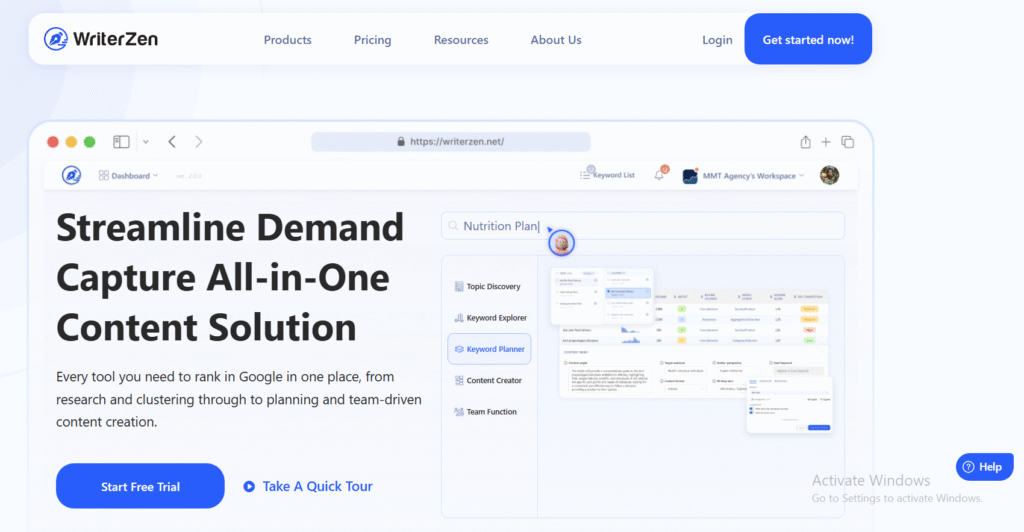
WriterZen brings together keyword research, content planning, and topic discovery into one clean interface. It’s especially popular with SEO content writers and teams who need both keyword data and clustering in a single place.
Key Features
1. Golden Filter for Keyword Selection
WriterZen’s proprietary “Golden Filter” identifies high-volume, low-competition keywords before clustering, saving time and improving ROI.
2. Automated Keyword Clustering
The clustering engine groups keywords based on SERP overlap, generating well-organised clusters ideal for content outlines.
3. Topic Discovery Tool
It identifies trending subtopics and related search terms for each keyword, helping writers understand user questions and search intent.
4. Built-in Content Editor
WriterZen integrates a writing workspace where you can draft and optimise articles based on the clustered keywords.
5. Keyword Validation Metrics
Provides difficulty scores, volume data, and relevancy percentages to guide your keyword targeting.
Pros and Cons
| Pros | Cons |
| Combines keyword research and clustering | Limited export formats |
| Beginner-friendly interface | Slightly slower processing for large lists |
| Excellent intent categorisation | Keyword limits on entry plans |
| Integrated topic and content planning | Doesn’t support multiple languages well |
Pricing
Plans start at $23 per month with tiered keyword credit limits. A 7-day free trial allows full testing before committing.
Best For SEO Writers and Content Planners
- Content writers — find easy-to-rank clusters for blogs
- Agencies — plan content calendars efficiently
- SEO strategists — merge keyword research with clustering
- eCommerce teams — create topical landing pages from clustered data
Verdict:
WriterZen’s all-in-one setup makes it an excellent choice for content-focused SEO professionals. Use its Golden Filter before clustering to ensure your content focuses on achievable keywords with measurable traffic potential.
How to Use WriterZen for Content Strategy
Start by entering your seed keyword. Filter results through the Golden Filter, then send them to the clustering tool. Build outlines from your strongest clusters using the built-in editor.
Best Alternate Tool
Topic Mojo is a good alternative for teams that prefer question-based keyword discovery with clustering features.
4. KeyClusters – Affordable, SERP-Based Keyword Grouping
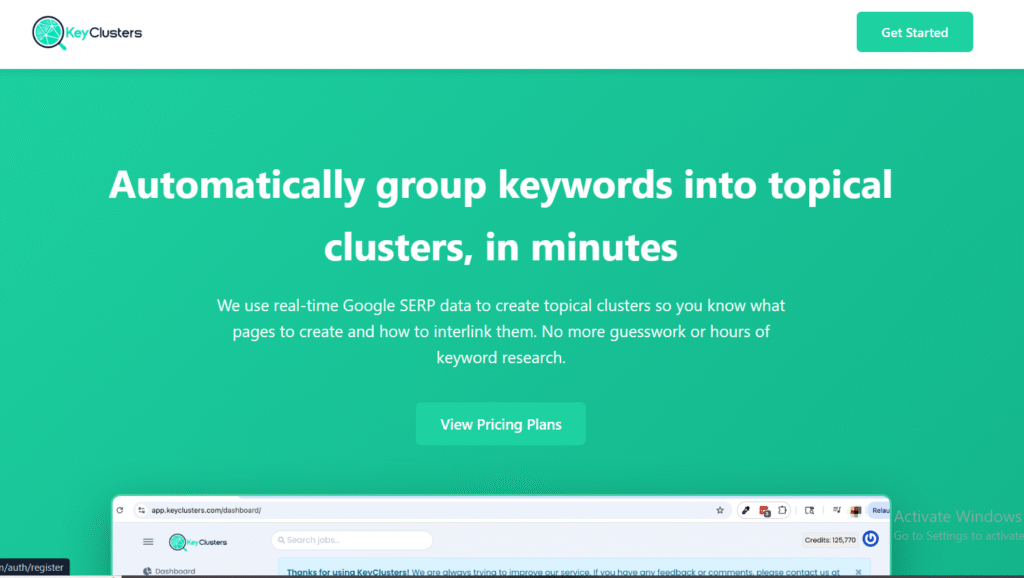
KeyClusters offers data-backed keyword clustering using live Google results. It’s particularly attractive to freelancers and agencies working on large keyword sets due to its simplicity, affordability, and accuracy.
Key Features
1. SERP-Based Grouping
KeyClusters analyses Google’s top 10 results to find overlaps and groups keywords that share ranking URLs.
2. Fast Bulk Processing
Handles up to 50,000 keywords per project, making it suitable for agency-scale workloads.
3. Pay-as-You-Go Pricing
Instead of monthly plans, KeyClusters lets you pay for keyword batches, reducing cost for occasional use.
4. Multi-Region Support
You can select specific countries and languages for clustering, aligning results with local SERPs.
5. CSV Export
Outputs clusters in a simple CSV format ready for mapping in Excel or Google Sheets.
Pros and Cons
| Pros | Cons |
| Low-cost entry for freelancers | No keyword difficulty data |
| Highly accurate SERP-based grouping | No integrated keyword research |
| Simple, minimal interface | No visual reports |
| Handles large data volumes | Support limited to email |
Pricing
Pay-as-you-go credits start at $12 for 1,000 keywords. No subscription required.
Best For Freelancers and Small SEO Teams
- Freelancers — quick, low-cost clustering for clients
- Small agencies — manage keyword planning efficiently
- Start-ups — save money without compromising quality
- SEO analysts — export clusters for in-depth mapping
Verdict:
KeyClusters is one of the most affordable ways to get accurate keyword clusters without committing to a subscription. For best results, combine it with a tool like Ahrefs to collect your keywords first.
How to Use KeyClusters for Efficient Keyword Grouping
Upload your keyword list, select your region, and run clustering. Within minutes, export the output for mapping to content or silo structures.
Best Alternate Tool
Keyword Cupid offers similar results but includes a visual mind map for easier interpretation.
5. Surfer SEO – Keyword Clustering and On-Page Optimisation Combined
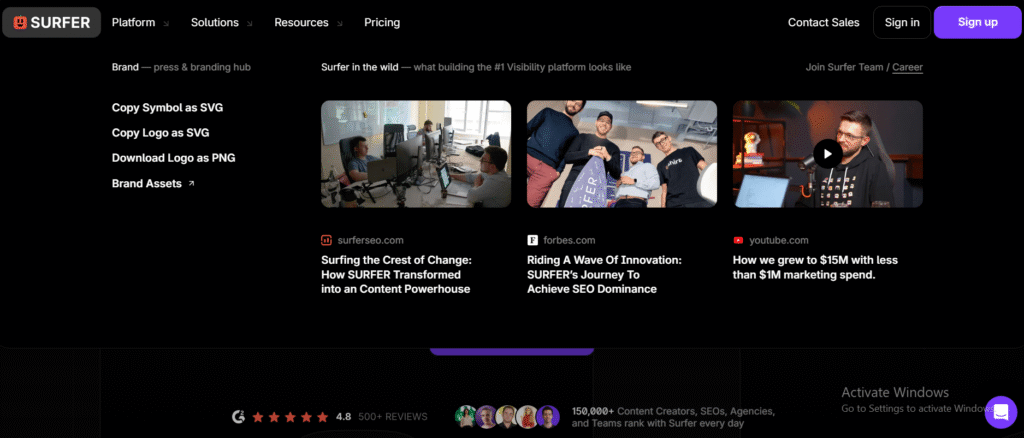
Surfer SEO stands out for merging keyword clustering with on-page optimisation and content analysis. It’s designed for marketers who want both keyword intelligence and guidance for writing optimised content in one place.
Key Features
1. Keyword Clustering Tool
Surfer automatically groups related terms and entities based on SERP similarities and NLP analysis.
2. SERP Analyzer
This tool compares your target keyword against competitors’ pages, showing ranking factors and word count suggestions.
3. Content Editor Integration
Writers can create optimised drafts directly in Surfer’s editor, using clustered terms and semantic recommendations.
4. AI-Powered Topic Suggestions
Surfer’s AI identifies entities and phrases that improve topical relevance, ensuring your content aligns with user search intent.
5. Content Planner
Automatically builds topic clusters and recommends content structures for your site’s blog or silo pages.
Pros and Cons
| Pros | Cons |
| Combines clustering with content optimisation | Higher price point for solo users |
| Strong NLP and AI features | Can feel data-heavy for beginners |
| Excellent integration with Google Docs | Limited free plan |
| Accurate SERP analysis | Occasional lag on large datasets |
Pricing
Surfer SEO starts at $89 per month. Higher tiers unlock additional credits for audits, clustering, and AI features.
Best For SEO Agencies and Content Strategists
- Agencies — build data-backed content strategies
- Content teams — optimise content using clustered keywords
- Freelancers — deliver full on-page optimisation reports
- Marketers — identify ranking opportunities from clusters
Verdict:
Surfer SEO provides both clustering and optimisation, making it one of the most complete tools available. Use its Content Planner to create content clusters aligned with competitive SERP insights.
How to Use Surfer SEO for Content Clustering
Use the Content Planner to generate topic clusters around your seed keyword. Export them, then refine the structure with Surfer’s Content Editor for perfectly optimised pages.
Best Alternate Tool
Frase is an alternative that focuses more on AI-generated briefs and NLP keyword clustering for content creation.
6. Topic Mojo – Keyword Clustering Through Question-Based Research
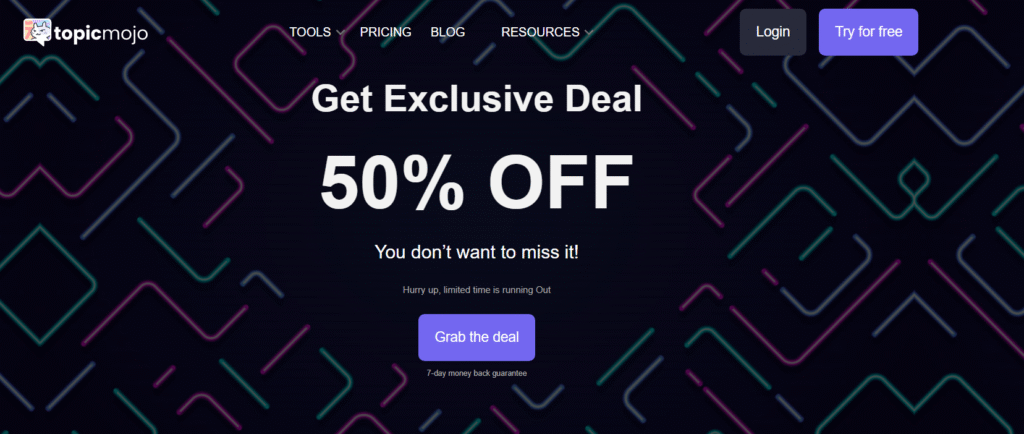
Topic Mojo helps SEO professionals discover keyword clusters through real search questions and trending topics. It’s a versatile tool that combines keyword clustering with audience insight, making it ideal for content marketers who want to produce valuable and engaging content.
Key Features
1. Question-Based Keyword Clustering
Topic Mojo clusters search terms around real questions from Google’s People Also Ask, Reddit, and Quora, making topic ideation much faster.
2. Topic Discovery Engine
The system identifies related topics and long-tail keywords, displaying them visually for easier planning.
3. Search Volume and CPC Data
For each cluster, Topic Mojo shows average search volume, cost per click, and competition level, allowing you to prioritise which clusters to target.
4. Competitor Analysis Integration
It extracts top-performing pages for each topic cluster, helping you see what content already ranks and how to outperform it.
5. Export and Team Collaboration
All clusters and keyword lists can be exported or shared within teams, simplifying workflow management.
Pros and Cons
| Pros | Cons |
| Great for question-based content planning | Limited advanced keyword metrics |
| User-friendly visual interface | Slower on very large datasets |
| Excellent for ideation and research | Lacks AI clustering |
| Strong export and sharing features | Interface can feel busy |
Pricing
Topic Mojo plans start at $49 per month, with unlimited searches on higher tiers. A 7-day free trial is available.
Best For Content Marketers and Blog Strategists
- SEO writers — build content around high-intent questions
- Bloggers — identify trending clusters to target
- Agencies — map out FAQ-driven content for clients
- Content teams — streamline idea generation from questions
Verdict:
Topic Mojo excels at helping marketers uncover the questions behind searches. Use it to find keyword clusters that connect directly with your audience’s pain points.
How to Use Topic Mojo for Research-Based Content
Search for a core keyword, export question-based clusters, and group them into content themes. Combine them with AnswerThePublic for even more granular data.
Best Alternate Tool
WriterZen offers a more detailed keyword database if you need deeper competition metrics alongside clustering.
7. KeyWI – AI-Powered Keyword Grouping for Smarter SEO
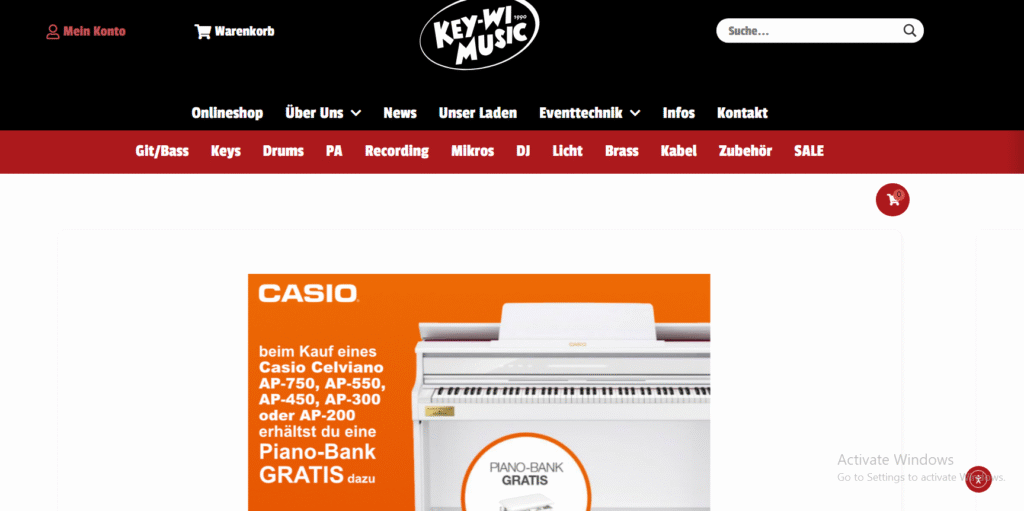
KeyWI uses artificial intelligence to group keywords by meaning and intent rather than just shared URLs. It’s designed for content strategists who want automated clustering and topic discovery that reflects real search semantics.
Key Features
1. AI Keyword Grouping
Instead of relying solely on SERP overlap, KeyWI uses natural language processing to understand the meaning behind search queries.
2. Smart Cluster Logic
The AI engine identifies overlapping intent and contextual similarity, making the clusters more accurate for semantic SEO.
3. Performance Analytics
You can track how your clusters perform over time, making it easy to refine content strategies.
4. Competitor Benchmarking
KeyWI compares your clustered keywords with competitor domains, highlighting topic gaps and ranking opportunities.
5. Language Support
The platform supports multiple languages, ideal for global campaigns.
Pros and Cons
| Pros | Cons |
| AI-powered intent-based grouping | Premium pricing tiers |
| Detailed performance tracking | Slight learning curve |
| Excellent multi-language support | No pay-as-you-go option |
| Ideal for enterprise-level campaigns | May over-cluster niche topics |
Pricing
Plans begin at $50 per month, with enterprise options available on request.
Best For Enterprise SEO Teams and Agencies
- SEO agencies — automate keyword clustering at scale
- Marketing teams — identify high-performing content topics
- Global brands — handle multi-language clustering campaigns
- Content strategists — plan topics based on semantic relationships
Verdict:
KeyWI’s AI grouping is exceptionally accurate, ideal for scaling international SEO strategies. Use its benchmarking feature to uncover keyword clusters your competitors haven’t targeted.
How to Use KeyWI for AI-Driven Keyword Strategy
Import your keyword list, let the AI cluster and label the groups, then compare clusters with your current content library to fill topical gaps.
Best Alternate Tool
Clusteric provides a similar AI-powered clustering option with more focus on technical SEO integration.
8. Clusteric – SEO Tool with Technical and Clustering Capabilities
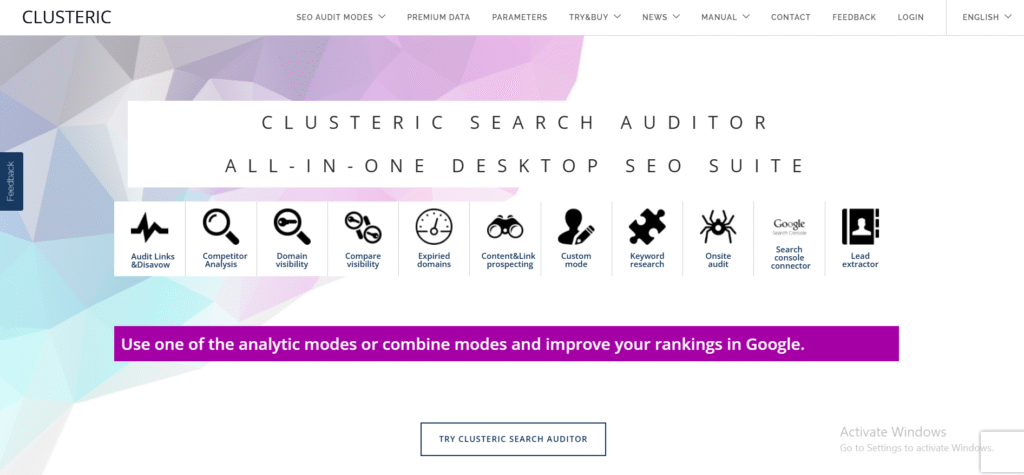
Clusteric blends technical SEO auditing with keyword clustering, providing a dual solution for those who want to combine on-page diagnostics with topic planning.
Key Features
1. Integrated Keyword Clustering
Clusteric groups your keywords into thematic clusters and cross-references them with ranking URLs and SERP intent.
2. Rank Tracking Integration
The tool includes a rank tracker that links performance data to each cluster, offering insight into visibility changes.
3. Competitor Gap Analysis
It identifies missing keyword clusters on your site compared to top-ranking competitors.
4. Content Scoring
Clusteric assigns quality scores to each content piece based on keyword coverage and SEO metrics.
5. Multi-Project Dashboard
You can manage multiple websites or campaigns within a single account, suitable for agencies handling multiple clients.
Pros and Cons
| Pros | Cons |
| Combines technical SEO and clustering | Interface can feel complex |
| In-depth keyword performance tracking | Pricing higher than average |
| Multi-project management | Limited automation options |
| Excellent for competitive research | No free trial |
Pricing
Clusteric plans start at $59 per month, with higher tiers for larger teams.
Best For Technical SEO Experts and Agencies
- Technical SEOs — merge audits with keyword clustering
- Agencies — manage multiple projects from one dashboard
- SEO analysts — link ranking performance to clusters
- Marketers — uncover on-page opportunities
Verdict:
Clusteric bridges the gap between technical SEO and keyword clustering. It’s best for teams that want detailed data rather than simple grouping.
How to Use Clusteric for Campaign Optimisation
Upload your keyword data, cluster it, and use the audit features to ensure each cluster has optimised landing pages.
Best Alternate Tool
SE Ranking offers similar capabilities with a simpler interface and lower pricing.
9. Ahrefs – Keyword Data and Cluster-Friendly Analysis
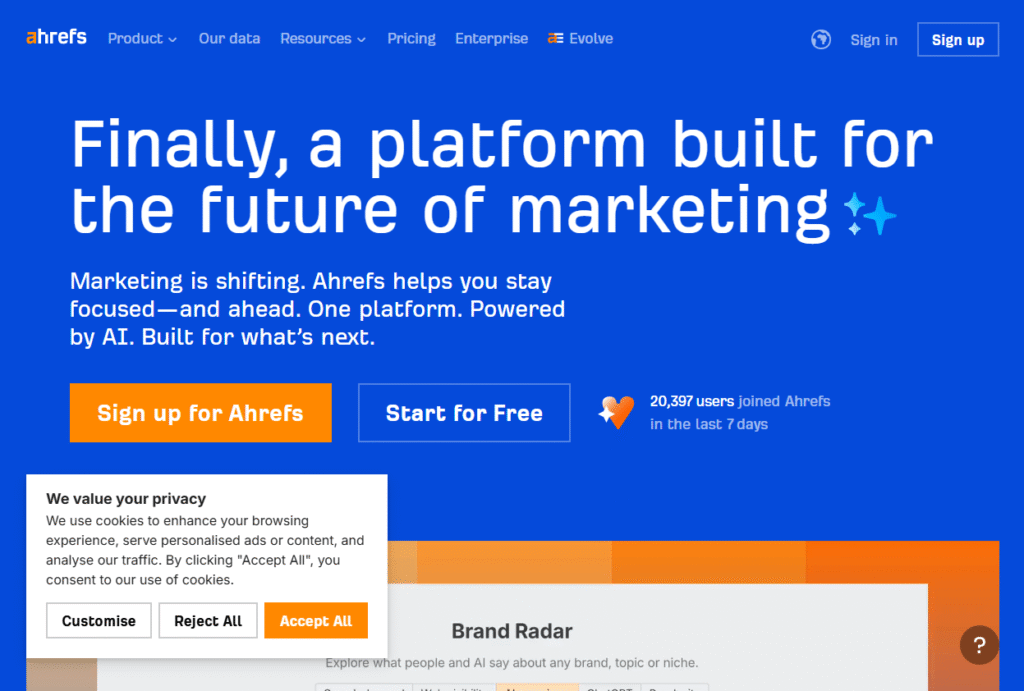
While Ahrefs doesn’t have a dedicated keyword clustering tool, its powerful Keyword Explorer and data exports make it excellent for building clusters manually. Many agencies use Ahrefs as the data foundation before importing keywords into clustering tools like Keyword Insights or ClusterAi.
Key Features
1. Keyword Explorer
Ahrefs provides keyword ideas with volume, difficulty, and click metrics, perfect for identifying cluster candidates.
2. SERP Overview
You can view the top-ranking pages for any keyword, helping to find overlapping URLs that suggest cluster potential.
3. Keyword Lists
Save and group keywords manually into lists for custom clustering.
4. Competitor Keyword Gap Tool
Identify topics that your competitors rank for but you don’t, forming new cluster opportunities.
5. Export and Integration
Easily export data to CSV or Google Sheets for use with external clustering platforms.
Pros and Cons
| Pros | Cons |
| Exceptional keyword data depth | No automated clustering |
| Excellent SERP insights | Requires manual cluster building |
| Great for competitor analysis | Higher pricing tiers |
| Trusted by professionals worldwide | Limited local clustering data |
Pricing
Ahrefs starts at $99 per month, with higher-tier plans for larger teams.
Best For SEO Professionals Who Prefer Manual Control
- SEO strategists — create manual clusters based on data accuracy
- Agencies — export keyword sets for detailed analysis
- Freelancers — perform research before clustering in other tools
- Marketers — validate clusters with live SERP data
Verdict:
Ahrefs is the best tool for data accuracy and pre-cluster keyword discovery. Combine it with a dedicated clustering tool to build complete topic maps.
How to Use Ahrefs for Keyword Clustering
Run a broad keyword search, export the list, and use overlapping URLs in the SERP analysis to create manual clusters.
Best Alternate Tool
SEMrush offers a similar database with a keyword clustering feature built in, making it more automated for busy teams.
10. SEMrush – All-in-One SEO Suite with Keyword Clustering
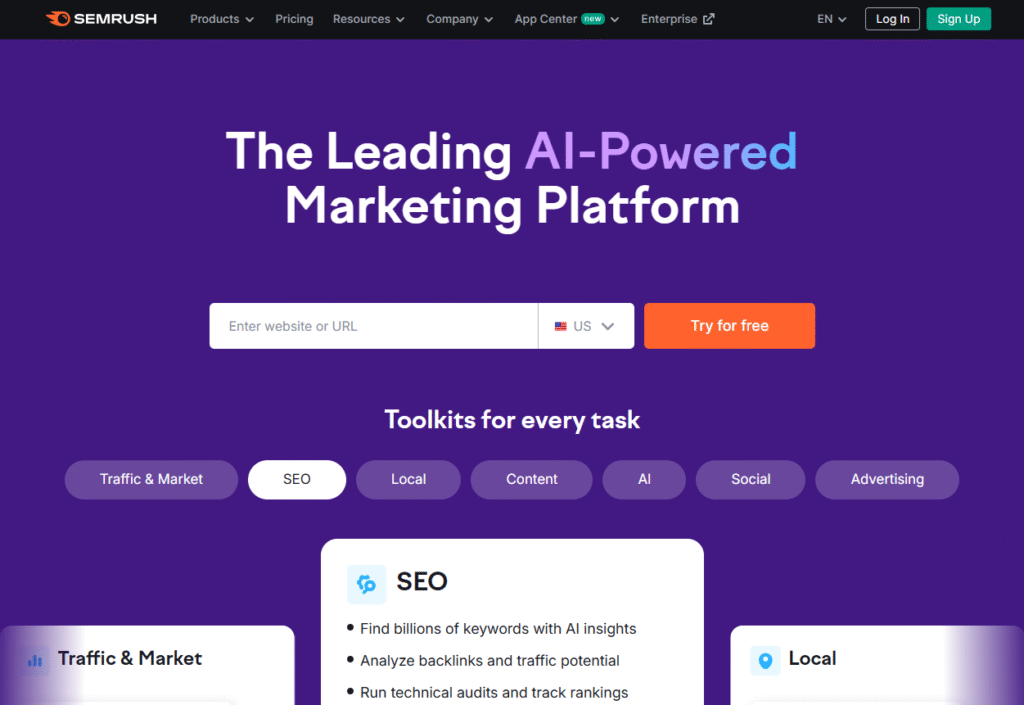
SEMrush is one of the most popular all-in-one SEO platforms, offering keyword clustering through its Keyword Magic Tool and Topic Research module. It’s widely used by agencies and in-house teams managing complex campaigns.
Key Features
1. Keyword Magic Tool
Generates massive keyword lists and automatically groups them into clusters based on topic and intent.
2. Topic Research
Builds content ideas around clusters, including popular headlines and related questions.
3. SEO Writing Assistant
Helps optimise content directly in Google Docs or WordPress, using clustered keywords.
4. Keyword Gap Analysis
Identifies missing clusters between you and your competitors, highlighting growth opportunities.
5. Multi-User Access
Supports large teams with shared projects and permissions.
Pros and Cons
| Pros | Cons |
| Combines research, clustering, and optimisation | Premium cost for small businesses |
| Ideal for agencies and teams | Interface can be overwhelming |
| Reliable keyword data | Limited export flexibility |
| Excellent integration with WordPress | Occasional lag on large projects |
Pricing
SEMrush pricing begins at $129 per month, with additional seats and credits available for team use.
Best For Large Agencies and Marketing Teams
- SEO agencies — full-scale keyword and cluster management
- In-house teams — streamline content planning
- Digital marketers — combine competitive research and clustering
- Enterprises — manage multiple markets and projects
Verdict:
SEMrush combines powerful keyword clustering with extensive competitive data. It’s the go-to platform for large-scale SEO teams.
How to Use SEMrush for Clustered Keyword Research
Use the Keyword Magic Tool to generate clusters, then link them to the Topic Research module for a complete strategy blueprint.
Best Alternate Tool
SE Ranking is a cost-effective alternative with similar features and more flexible pricing.
11. SE Ranking – Keyword Grouping and Rank Tracking for SEO Teams
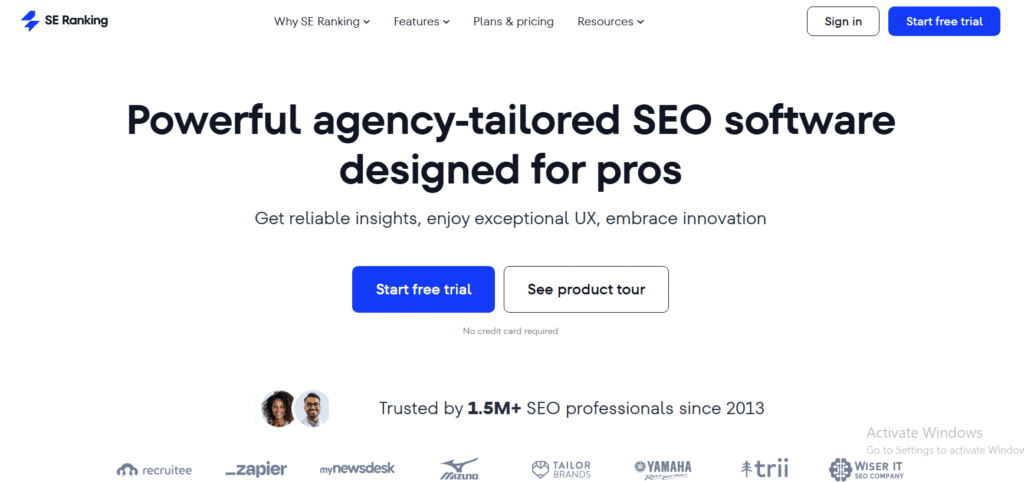
SE Ranking offers one of the most comprehensive keyword grouping systems built into a full SEO platform. It’s ideal for agencies and in-house marketers who want clustering integrated with rank tracking and reporting tools.
Key Features
1. Keyword Grouping Tool
SE Ranking groups keywords based on SERP data, creating clusters that reflect how Google understands topical relationships.
2. Automated Rank Tracking
Once your clusters are set, SE Ranking monitors rankings for every term and shows how clusters perform as a whole.
3. On-Page Checker
This feature evaluates how well your content matches its clustered keywords, helping to fix underperforming pages.
4. Competitor Keyword Research
Identify keyword gaps and emerging clusters that competitors are targeting.
5. Reporting Suite
Generate white-labelled reports combining keyword cluster performance with ranking metrics.
Pros and Cons
| Pros | Cons |
| Combines keyword grouping and tracking | Interface can be slow with large projects |
| White-labelled reports for agencies | No AI-driven clustering |
| Affordable compared to similar tools | Requires setup time |
| Excellent local SEO support | Limited historical SERP data |
Pricing
Plans start at $55 per month with discounts on annual subscriptions.
Best For Small and Mid-Sized SEO Agencies
- Agencies — manage multiple clients and track clustered keyword performance
- SEO teams — plan and report with ease
- Local businesses — focus on geographic clustering
- Consultants — bundle reporting with keyword analysis
Verdict:
SE Ranking provides an effective mix of clustering and reporting. It’s perfect for those who want to monitor keyword groups’ performance over time.
How to Use SE Ranking for Ongoing SEO Campaigns
Upload your keyword list, create clusters, and assign each to a landing page. Then use the rank tracker to measure visibility improvements by cluster.
Best Alternate Tool
Clusteric offers deeper integration with technical SEO features if your focus is on audits.
12. NeuralText – AI-Powered Keyword Clustering and Content Generation
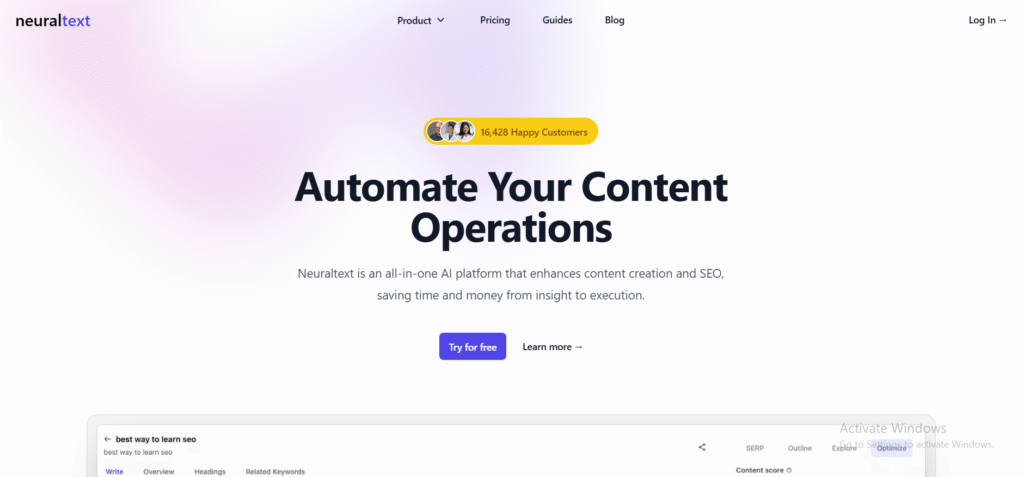
NeuralText merges keyword clustering with AI writing capabilities, helping marketers turn clustered keywords into content briefs and drafts faster than ever.
Key Features
1. AI Keyword Clustering
NeuralText uses NLP to group keywords based on meaning and SERP overlap, reducing manual labour.
2. AI Content Brief Generator
After clustering, the platform suggests outlines, subheadings, and questions to include for each topic.
3. Competitor SERP Analysis
It analyses top-ranking pages to identify common topics and semantic gaps.
4. SEO Content Writer
Writers can draft articles directly in NeuralText using the suggested clusters and AI recommendations.
5. Collaboration and Sharing
Teams can share projects and content briefs seamlessly within one workspace.
Pros and Cons
| Pros | Cons |
| Combines clustering and AI writing | AI drafts may need manual editing |
| Excellent for content planning | Limited advanced keyword metrics |
| Easy-to-use dashboard | Higher tiers required for larger projects |
| Time-saving for teams | Occasional delays during SERP data processing |
Pricing
NeuralText starts at $49 per month with AI content and clustering credits included.
Best For Content Teams and Agencies Scaling Content Production
- Content strategists — automate topic planning and writing
- Agencies — deliver faster client content projects
- SEO teams — build semantic keyword maps for articles
- Freelancers — generate briefs quickly for multiple clients
Verdict:
NeuralText offers excellent workflow automation for marketers who handle both research and content creation. Use its AI writer to draft SEO-friendly outlines directly from clusters.
How to Use NeuralText for Quick Content Briefing
Input your keyword list, cluster them, and generate an AI brief. Share it with your writing team or use it in Google Docs for editing.
Best Alternate Tool
Frase provides a similar AI brief generator with deeper optimisation recommendations.
13. Keyword Cupid – Visual Keyword Clustering for Data-Lovers
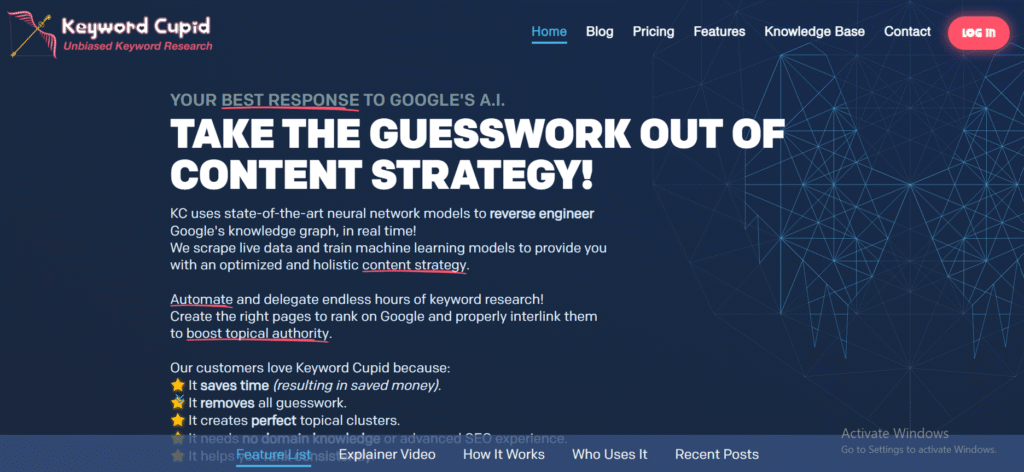
Keyword Cupid is a visual keyword clustering platform that maps search intent into an interactive mind map. It’s particularly useful for SEOs who prefer visual data when planning site architecture or topic silos.
Key Features
1. Automated Keyword Clustering
Keyword Cupid groups terms by shared ranking URLs and displays them visually as a network map.
2. Mind Map View
The visual interface allows users to see relationships between keyword groups, making silo planning intuitive.
3. SERP Intent Analysis
Each cluster is categorised by search intent—informational, commercial, or transactional.
4. Easy Export Options
Clusters and maps can be downloaded in CSV format for content strategy integration.
5. Batch Processing
Handles thousands of keywords in one upload, ideal for large-scale campaigns.
Pros and Cons
| Pros | Cons |
| Visual representation of clusters | Interface can be slow on large datasets |
| Strong intent categorisation | Limited keyword metrics |
| Affordable entry pricing | No free plan |
| Great for content mapping | Mind map view can feel cluttered |
Pricing
Keyword Cupid starts at $9.99 per month with pay-as-you-go keyword credits.
Best For Visual Thinkers and Technical SEOs
- SEO strategists — map keyword relationships visually
- Agencies — present keyword strategies to clients clearly
- Web developers — plan silo structures for site builds
- Bloggers — identify content themes easily
Verdict:
Keyword Cupid transforms keyword clustering into a visual experience. Use it to map content clusters for SEO projects that rely on clear topic silos.
How to Use Keyword Cupid for Visual Keyword Mapping
Upload your keyword list, process the data, and analyse the visual mind map. Highlight intent-based clusters for your next content projects.
Best Alternate Tool
KeyClusters offers similar clustering precision without the visual interface, making it faster for bulk processing.
14. Cluster AI by Content Distribution – Bulk Keyword Organisation for Agencies

Cluster AI by Content Distribution is built for speed and scalability. It’s widely used by agencies that need to process massive keyword datasets and build accurate content clusters at scale.
Key Features
1. Bulk Keyword Uploads
Upload thousands of keywords and let the system cluster them based on shared top-ranking URLs.
2. SERP Intent Matching
Cluster AI uses Google’s SERP data to ensure each group targets a unique intent.
3. CSV Export for Team Use
Exports clusters ready for integration into content calendars and briefs.
4. Simple, No-Frills Dashboard
The interface is clean, quick, and designed for batch processing rather than daily use.
5. High-Speed Clustering
Known for one of the fastest SERP parsing engines among all clustering tools.
Pros and Cons
| Pros | Cons |
| Fast, accurate bulk clustering | No free trial |
| Clean and simple interface | No keyword metrics or AI features |
| Ideal for agencies | No collaboration tools |
| Affordable for high-volume users | Manual intent tagging required |
Pricing
Plans start at $39 per month, with discounts for high-volume users.
Best For SEO Agencies Handling Large Keyword Lists
- Agencies — manage keyword clustering for multiple clients
- Freelancers — process large datasets efficiently
- SEO analysts — prepare clusters for strategic planning
- Start-ups — low-cost option for keyword management
Verdict:
Cluster AI is built for volume and efficiency. It’s best suited to professionals who need fast, accurate clusters without advanced add-ons.
How to Use Cluster AI for Client SEO Campaigns
Import client keywords, cluster by intent, and export grouped topics for editorial planning.
Best Alternate Tool
ClusterAi offers similar SERP-based clustering with a more modern interface.
15. KeyClusters.io – Intent-Focused Keyword Clustering at Scale
KeyClusters.io is a lightweight but powerful keyword clustering platform built for SEO professionals who prioritise intent and precision. It’s ideal for large datasets and multilingual campaigns.
Key Features
1. SERP Intent-Based Clustering
KeyClusters.io analyses top-ranking URLs and categorises clusters by intent.
2. Multi-Language and Regional Support
Supports clustering across multiple countries and languages, aligning results with target markets.
3. Batch Processing
Process up to 20,000 keywords at once, suitable for enterprise-scale campaigns.
4. CSV and API Access
Developers can integrate clustering results directly into existing dashboards or workflows.
5. Simple Pay-As-You-Go Model
No subscription commitments—ideal for occasional large projects.
Pros and Cons
| Pros | Cons |
| Supports multi-language campaigns | Basic reporting interface |
| Intent-based clustering | No AI semantic analysis |
| API access for developers | Customer support limited to email |
| Fast processing speeds | Minimal documentation |
Pricing
Starting at $14 per month or pay-as-you-go credits based on keyword count.
Best For Agencies and Developers Handling Global Campaigns
- SEO agencies — process multilingual keyword data
- Developers — integrate clustering into internal tools
- Global marketing teams — manage country-specific strategies
- Content strategists — plan topic silos for different markets
Verdict:
KeyClusters.io is an excellent choice for data-focused SEOs who need flexibility and scalability. Its intent-based grouping is dependable and simple to export.
How to Use KeyClusters.io for Multi-Language SEO Projects
Upload country-specific keyword lists, run clustering, and export each set to align with regional content strategies.
Best Alternate Tool
KeyWI offers AI-powered semantic clustering if you prefer deeper contextual analysis.
16. TopicRanker – Discover Keyword Clusters Through SERP Weakness Analysis
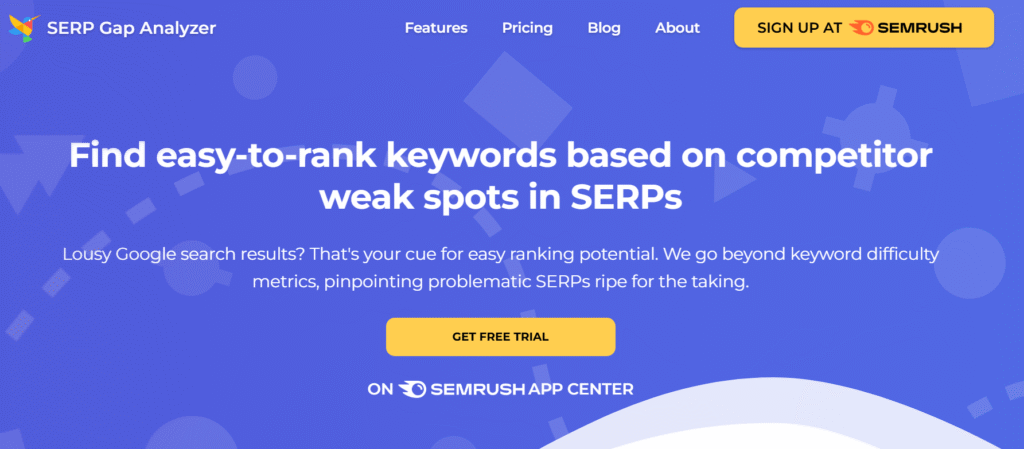
TopicRanker is a keyword clustering tool that goes beyond simple grouping. It identifies the weaknesses in competitors’ pages for each keyword cluster, allowing marketers to create content that outranks existing results.
Key Features
1. Competitor Weakness Analysis
TopicRanker analyses Google SERPs to highlight why top-ranking pages succeed or fail for each cluster, helping you target exploitable gaps.
2. Keyword Difficulty and Intent Tagging
Automatically labels each keyword with difficulty, search volume, and intent for prioritisation.
3. Cluster Generation
Groups keywords by shared SERP results and related terms, ideal for planning topical content strategies.
4. Keyword Opportunity Scoring
Ranks keyword clusters based on their ease of ranking, combining volume and competition metrics.
5. Simple Dashboard and Reports
Offers clean, exportable reports ideal for content strategy presentations.
Pros and Cons
| Pros | Cons |
| Unique competitor weakness insight | No API integration |
| Automated cluster scoring | Higher pricing for smaller teams |
| Intent and difficulty tagging built-in | Limited data for low-volume markets |
| Excellent reporting design | Occasional slowdowns during SERP scans |
Pricing
TopicRanker starts at $59 per month, including SERP scans and keyword opportunity scoring.
Best For Marketers Focusing on Competitive SEO Campaigns
- SEO consultants — identify easy-win clusters
- Agencies — highlight competitor weaknesses for clients
- Content strategists — prioritise low-difficulty clusters
- Bloggers — choose clusters with best ranking potential
Verdict:
TopicRanker helps you move beyond keyword lists by showing where competitors fall short. Focus on its “weakness” insights to build stronger, search-friendly content around clusters.
How to Use TopicRanker for Opportunity-Based Clustering
Enter a seed keyword, analyse competitor data, and export the suggested keyword clusters with ranking opportunities clearly marked.
Best Alternate Tool
SEMrush provides more detailed competitor metrics if you need in-depth benchmarking.
17. SEOScout – Keyword Clustering and Content Optimisation in One
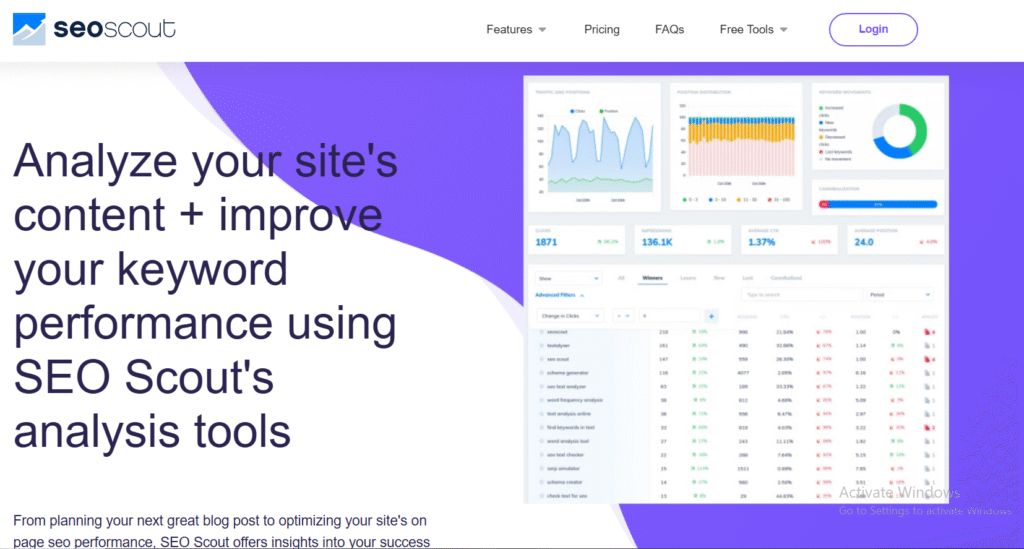
SEOScout combines clustering, content auditing, and optimisation tools, making it a practical choice for content teams who want to measure and refine existing work alongside new keyword clusters.
Key Features
1. Content Optimisation with Keyword Clustering
Clusters your keyword data and cross-references it with your live content to identify under-optimised articles.
2. SERP Intent Grouping
Groups keywords based on intent to guide you in writing the right type of content—informational, commercial, or transactional.
3. Content Auditing Tool
Scans your site to find gaps or overlaps in topics within existing pages.
4. Competitor Comparison
Shows keyword clusters your competitors target but you don’t, helping refine your content roadmap.
5. Real-Time Feedback
Offers on-page recommendations for content improvements based on clustered keyword data.
Pros and Cons
| Pros | Cons |
| Excellent content integration | No AI-based clustering |
| Real-time optimisation tips | Learning curve for beginners |
| Competitor gap analysis included | Limited reporting export options |
| Combines audits and clustering | Higher cost for small websites |
Pricing
Plans start at $49 per month, with options for content teams and agencies.
Best For Content Teams Managing Existing Websites
- SEO content managers — improve performance of existing articles
- Agencies — conduct keyword-based content audits
- Marketers — identify new clusters for expansion
- Copywriters — write pages around intent-focused groups
Verdict:
SEOScout is ideal for teams who manage both keyword research and live content optimisation. It’s best used to maintain long-term SEO growth and avoid cannibalisation.
How to Use SEOScout for Content Refinement
Upload your content URLs, import keyword lists, and review overlapping clusters. Adjust existing content based on intent insights.
Best Alternate Tool
Surfer SEO offers similar optimisation features with a more advanced AI engine.
18. Frase – AI Content Creation and Keyword Clustering for SEO
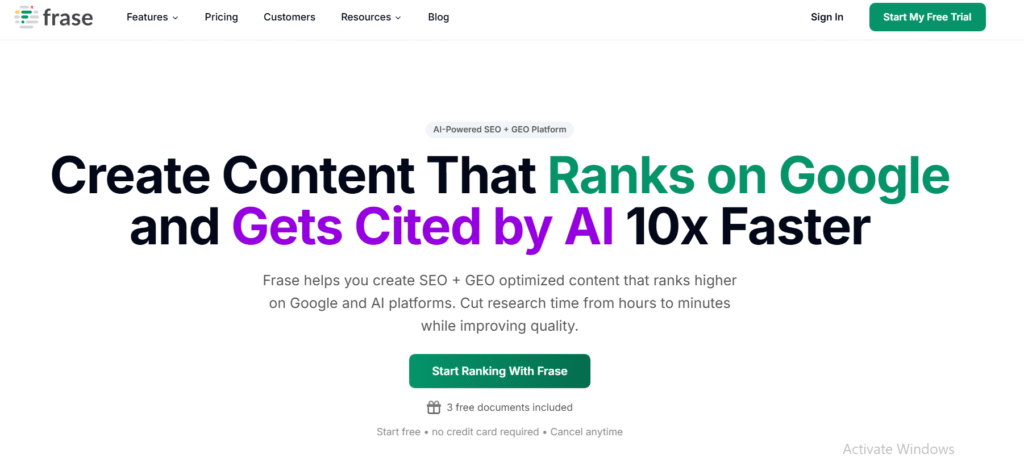
Frase is an AI-driven content platform that combines keyword clustering with intelligent brief generation and optimisation. It’s widely used by agencies and content marketers for creating high-ranking, semantically rich content.
Key Features
1. AI Keyword Clustering
Frase automatically groups keywords based on semantic relationships rather than simple SERP overlap.
2. Topic Research and Brief Generation
Generates SEO-friendly briefs, subtopics, and FAQs based on top-ranking content for each cluster.
3. AI Writing and Optimisation
Writers can generate and optimise articles directly inside the Frase editor using NLP keyword recommendations.
4. Content Scoring
Assigns scores to your content based on how well it matches clustered keyword intent.
5. Competitor Overview
Shows related content outlines from ranking pages to help you outperform them.
Pros and Cons
| Pros | Cons |
| Combines keyword clustering with AI writing | Limited integrations |
| Real-time content scoring | Higher price for full features |
| Excellent topic discovery | AI suggestions can feel generic |
| Ideal for SEO writers | Steeper learning curve for new users |
Pricing
Frase starts at $14.99 per month, with content optimisation and AI writing credits available.
Best For SEO Writers and Content Marketers
- Writers — generate content briefs in minutes
- Agencies — create consistent content for clients
- SEO teams — align keyword clusters with writing tasks
- Bloggers — optimise posts for better ranking
Verdict:
Frase is a robust all-in-one system for both clustering and content creation. It’s especially effective for marketers managing high-volume publishing schedules.
How to Use Frase for Optimised Content Clusters
Run your seed keyword, build clusters, generate briefs, and let Frase guide your content outline and optimisation process.
Best Alternate Tool
NeuralText offers similar functionality with simpler reporting for smaller teams.
19. Keyword Insights AI – Automated Keyword Clustering with Intent Mapping
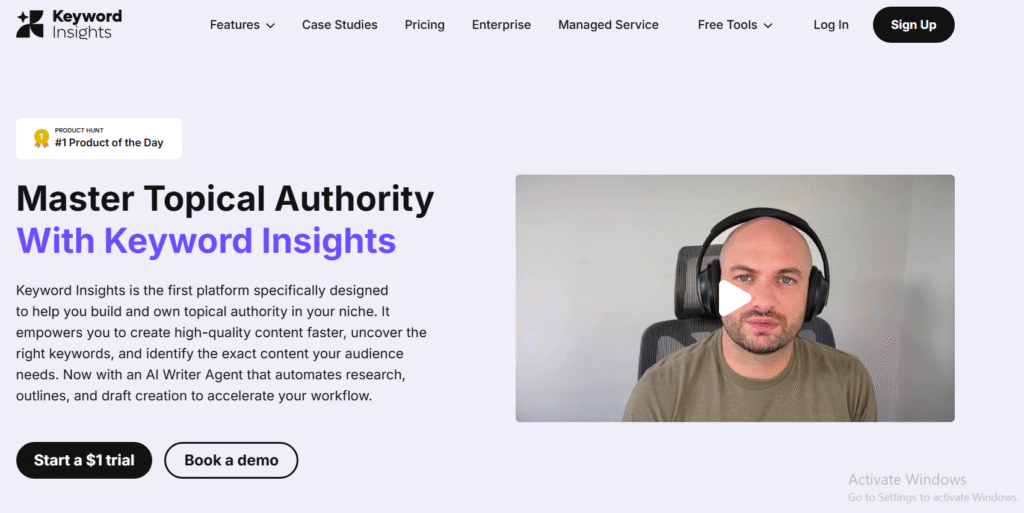
Keyword Insights AI builds on the traditional version with advanced automation and real-time SERP monitoring. It’s designed for agencies managing constant keyword research and re-clustering.
Key Features
1. Automated Re-Clustering
Clusters are refreshed automatically as Google SERPs change, ensuring data accuracy over time.
2. Intent and Topic Mapping
Each keyword is linked to an intent type and cluster hierarchy, providing clarity for large campaigns.
3. Dynamic Reporting
Live dashboards display how keyword clusters evolve, helping with trend forecasting.
4. API Access
Developers can integrate clustering results into their own dashboards or keyword research tools.
5. Team Management
Multiple user access makes it suitable for agencies and content teams.
Pros and Cons
| Pros | Cons |
| Automatic re-clustering for accuracy | Premium pricing for automation |
| Intent mapping for every keyword | Complex setup for small teams |
| Live dashboards and reports | Requires large keyword volumes for value |
| Excellent for ongoing campaigns | Limited historical data tracking |
Pricing
Keyword Insights AI plans start at $99 per month, depending on keyword volume.
Best For Agencies and Enterprises Managing Continuous SEO Campaigns
- Agencies — automate keyword cluster maintenance
- SEO strategists — monitor intent shifts over time
- Enterprises — manage global campaigns at scale
- Data analysts — integrate clustering into internal systems
Verdict:
Keyword Insights AI is a time-saving solution for agencies that need consistent and dynamic clustering updates. Its automation is unmatched for large-scale campaigns.
How to Use Keyword Insights AI for Continuous SEO Monitoring
Set your keyword projects, enable automatic re-clustering, and track shifts in search intent weekly for proactive content adjustments.
Best Alternate Tool
KeyWI provides similar AI clustering with additional performance analytics.
20. Topic Explorer by MarketMuse – Advanced Content Clustering and Strategy Planning
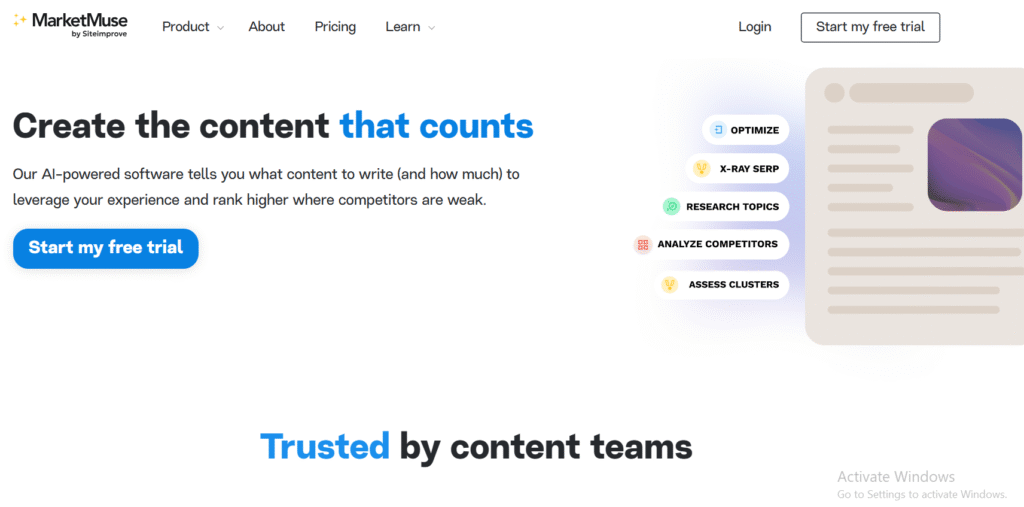
Topic Explorer by MarketMuse is a premium tool designed for enterprise content teams. It combines keyword clustering with topic modelling to identify content gaps and high-value opportunities.
Key Features
1. Topic Modelling and Keyword Clustering
Uses AI to group keywords into semantically related topics, ensuring alignment with search intent.
2. Competitive Content Scoring
Compares your current pages against competitors’ content within each cluster.
3. Opportunity Insights
Highlights clusters that will deliver the best return on effort based on competition and topical authority.
4. Internal Linking Recommendations
Suggests linking opportunities between pages that share topic clusters.
5. Strategy Planning Workspace
Lets content teams manage projects, clusters, and briefs collaboratively.
Pros and Cons
| Pros | Cons |
| Comprehensive content intelligence | High entry price point |
| Advanced AI topic modelling | Steep learning curve |
| Strong internal linking insights | Enterprise focus only |
| Collaborative workspace | Slower processing times for very large sites |
Pricing
MarketMuse pricing begins at $149 per month, targeting medium to large enterprises.
Best For Large Content Teams and Enterprises
- Enterprise SEO teams — manage topic-level SEO strategies
- Agencies — build large-scale topical maps for clients
- Marketing teams — coordinate content around shared clusters
- Editors — maintain consistent topic coverage
Verdict:
Topic Explorer by MarketMuse sets the standard for enterprise content strategy. It’s best used for advanced content gap analysis and high-level SEO planning.
How to Use Topic Explorer for Enterprise SEO Strategy
Import your site’s content, run topic clustering, and use internal linking insights to build or update your site’s structure.
Best Alternate Tool
Surfer SEO is a more affordable option with strong NLP-based clustering for mid-sized teams.
Why These Keyword Clustering Tools Matter in 2025
SEO has shifted from focusing on isolated keywords to building topical authority. Keyword clustering tools help you gain topical authority by organising your keywords into meaningful groups that reflect real user intent. When used properly, clustering tools save time, reduce cannibalisation, and boost ranking potential across multiple search queries.
Agencies, freelancers, and content teams who master keyword clustering gain a serious edge. It’s no longer just about finding keywords—it’s about understanding their relationships and using that structure to create content that search engines trust.
How Pearl Lemon Can Support Your SEO and Keyword Clustering Strategy
At Pearl Lemon, we’ve built and refined SEO campaigns for hundreds of clients, using advanced keyword clustering methods to create powerful topical maps that drive sustainable growth. Our team uses the best tools on this list to identify ranking gaps, organise content strategies, and strengthen site authority.
Whether you’re planning a full SEO campaign, improving existing content, or scaling your keyword research process, we can provide hands-on expertise.
Schedule a consultation today and see how we can help grow your organic presence with precision and strategy..
FAQs
1. What is a keyword clustering tool?
A keyword clustering tool groups similar search terms together based on shared SERP results or semantic meaning. This helps in creating topic-based content that performs better in search engines.
2. Why is keyword clustering important for SEO?
Clustering ensures your site targets topics rather than single keywords, reducing cannibalisation and strengthening your topical authority.
3. Which keyword clustering tool is best for beginners?
Tools like ClusterAi and WriterZen are ideal for beginners due to their simple interfaces and clear output.
4. What’s the difference between SERP-based and AI-based clustering?
SERP-based clustering relies on shared ranking URLs, while AI-based tools like KeyWI or Frase use natural language processing to understand keyword meaning.
5. How often should I update my keyword clusters?
Review clusters every few months, or sooner if there are major shifts in search intent or algorithm updates.
6. Can keyword clustering improve existing content?
Yes, by assigning existing articles to relevant clusters, you can optimise content for related keywords and boost rankings.
7. What’s the best keyword clustering tool for agencies?
Keyword Insights, SE Ranking, and SEMrush are excellent for agencies managing multiple clients and campaigns.
8. How does Pearl Lemon use keyword clustering in campaigns?
We use clustering to plan content calendars, structure site silos, and ensure every page targets distinct search intents for better ranking synergy.
9. Is manual clustering still effective?
It can be for small projects, but automated tools save significant time and reduce human error.
10. Do keyword clustering tools include keyword research features?
Some do, like WriterZen and SEMrush, which integrate research, clustering, and content planning in one dashboard.

